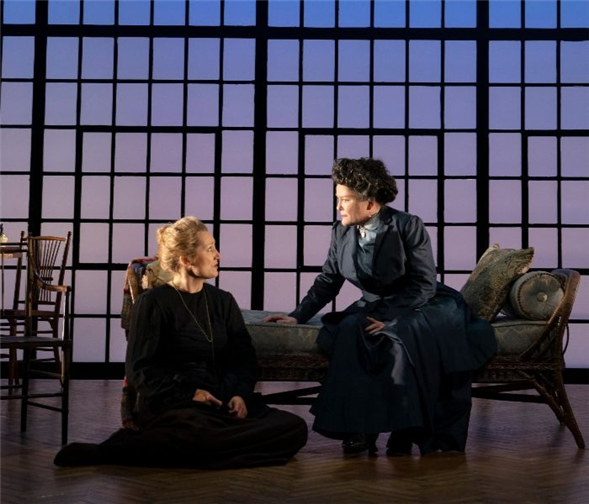Translate Page

Kate Mulgrew and Francesca Faridany on playing two remarkable women in science
---
If Marie Curie is just a name to you, you're not alone. Francesca Faridany admits she didn't know much about the two-time Nobel Prize-winning physicist and chemist until she landed the title role in Lauren Gunderson's The Half-Life of Marie Curie. Currently running at Audible's Minetta Lane Theatre, the one-act explores Curie's real-life friendship with engineer and inventor Hertha Ayrton, played by Star Trek: Voyager and Orange Is the New Black star Kate Mulgrew. Even Gunderson, who's written numerous plays about historical women in science, only learned about Ayrton relatively recently, via a Google Doodle marking the 162nd anniversary of her birth.
Set primarily in the summer of 1912 as Curie rides out a sex scandal at Ayrton's seaside home in England, The Half-Life of Marie Curie gives these incredible women their due and celebrates their remarkable achievements in the face of adversity. It's a history lesson, a feminist tale and a portrait of two complicated women all rolled into one.
"The fact that they accomplished what they did more than 100 years ago makes it such a staggering feat," says Faridany. "It's gobsmacking to me." Curie, who helped discover radium and polonium, was the first woman to be awarded a Nobel Prize and remains the only person to receive the honor in two different scientific fields: physics and chemistry. Ayrton received the distinguished Hughes Medal for her work on electric arcs and ripples in sand and water. "She carved a path that was not only singular but was pretty extraordinary," says Mulgrew. "In a time of such international political turmoil, where men seem to have darkened the skies considerably on all sides of the globe, we can remember these two women and what they did."
To prepare for the roles, Faridany and Mulgrew read biographies of Curie and Ayrton, as well as their letters to each other. The actors were impressed not just with their careers, but also Curie and Ayrton's lives outside their labs. "Hertha was vivid, smart, but deeply empathetic," Mulgrew says, noting that she was extremely active in the women's suffrage movement. Faridany learned that Curie even took a scientific approach to her domestic duties, taking extensive notes on breastfeeding and bread-making. "She did everything 100% and she always found the best way to do it," Faridany says.
Curie and Ayrton met at a science conference in London in 1903 and instantly connected. Their fellowship undoubtedly helped them navigate their male-dominated fields and the sexism they faced as women in the early 20th century. "It was one of those quite surprising and beautiful sparks that only rarely happen in life, and it ignited and did not diminish until Hertha died," says Mulgrew. Faridany agrees. "The power of this kind of friendship and having someone to say, 'Get up, let's go, you can do this!' is a really good thing to be reminded of."
Mulgrew and Faridany, who weren't acquainted before this production, say they've also developed a palpable rapport. "I was immediately taken with her and by her," says Mulgrew of Faridany. "It was just kind of kismet. You don't know if you're going to have natural chemistry with your partner and in a two-hander it is almost imperative."
For her part, Faridany is grateful to be able to power through the play with such a strong "no-nonsense" scene partner. "The journey that these two women go on is quite a workout," she says, noting that her character's despair is counterbalanced by Mulgrew's optimistic Ayrton, who gets to deliver a slew of delicious one-liners. "We have each other and it is a huge benefit to be able to look into her eyes and feel like we can do this together."
While there are only two women on stage, there are many others behind the scenes helping to tell this empowering story, including the playwright, director Gaye Taylor Upchurch, and the costume and scenic designers. "It was a room with a lot of estrogen," says Mulgrew with a laugh. "The preponderance of female energy lent itself to a sense of equilibrium and openness and, dare I say, kindness, which goes a long way to allowing me as a performer to let go."
Commissioned by Audible Theater, The Half-Life of Marie Curie will be released as an audio play on December 6. Faridany grew up in England listening to radio plays and she's thrilled that this inspirational tale will live on long after the show closes next month. "Women's stories are important," Faridany says. "I need to know that my 9-year-old daughter has continuing role models."
---
TDF MEMBERS: At press time, discount tickets were available for The Half-Life of Marie Curie. Go here to browse our current offers.
Allison Considine is a staff writer at American Theatre magazine. Follow her at @theatric_ally. Follow TDF at @TDFNYC.
Top image: Francesca Faridany and Kate Mulgrew in The Half-Life of Marie Curie. Photos by Joan Marcus.